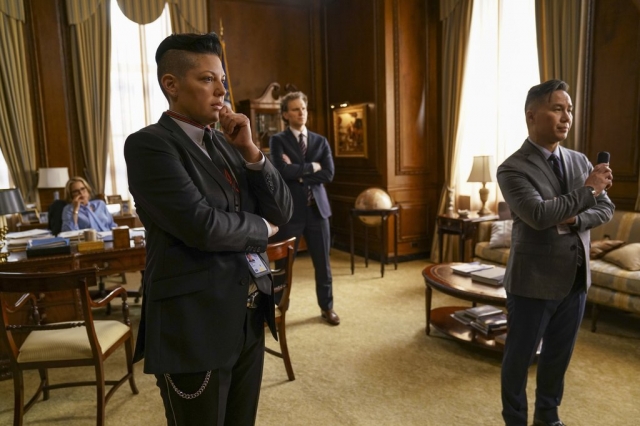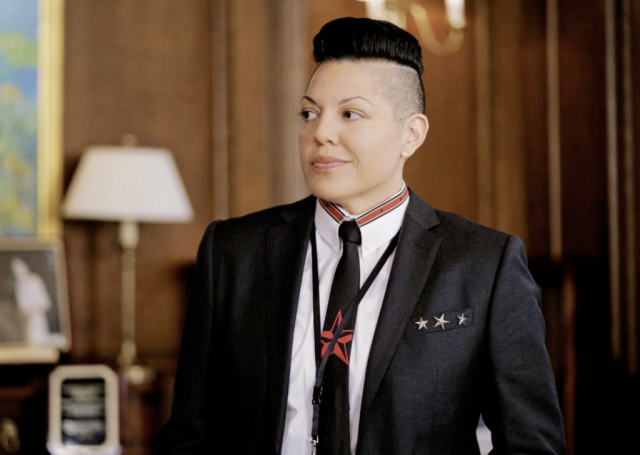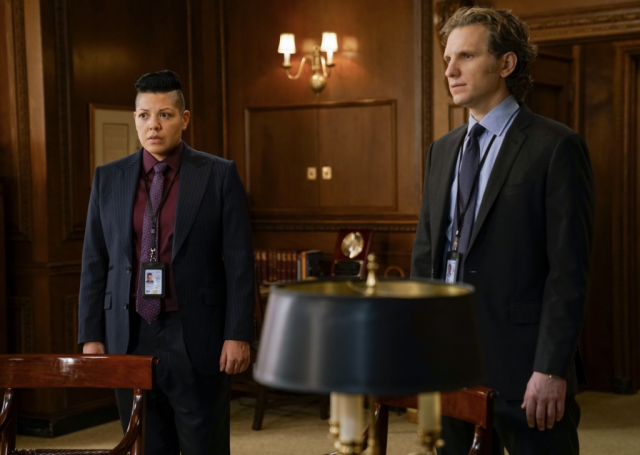In the last few months, we’ve had a few opportunities to celebrate Sara Ramirez’s new role as Kat Sandoval, Policy Advisor to Tea Leoni’s Secretary of State Elizabeth McCord on CBS’ Madam Secretary. We’ve swooned over nerdy butch swagger. We’ve swooned over it a lot. In a recent Madam Secretary episode, “Refuge,” the show gave Ramirez space to really shine as Kat guides us through a fictionalized, but nonetheless harrowing LGBTQIA+ human rights violation case. She also explores her personal, multiple intersections, coming out to the viewing audience as a queer, bisexual woman.
When we first see Kat Sandoval in “Refuge” she’s visibly distraught. She interrupts a committee meeting with the Secretary of State; her voice is wavering with an edge that somewhere between despair and rage. She keeps fiddling her tie with her hands, as if she just doesn’t know where to place them. She’s just been told of a club raid in Abkhazia, where the government arrested everyone on trumped up charges of prostitution and resisting arrest. There have been five such raids in Abkhazia this month alone, and those are just the ones the State Department knows about. The newest intelligence suggests that these people are being rounded up, beaten, tortured, sometimes to death. Kat’s been given word that asylum seekers at the US embassy are saying that they are facing genocide. While Secretary McCord works diplomatic channels with Abkhazia, Jay Whitman, the Secretary’s Chief of Staff, and Kat work together with The Human Crisis Foundation, a fictionalized version of OutRight Action International, who provided consultation on the episode.
The President of Abkhazia assures Secretary McCord that innocent citizens have not been harmed in Abkhazia. When she reminds him that he signed a treaty making homosexuality legal in his country, he responds that there are no homosexuals in Abkhazia. It’s chilling. Kat stands behind Secretary McCord throughout the video call. It’s a testament to Sara Ramirez’s talent that, without pulling focus, she is fully invested in the scene. Even in background, Kat’s rage seethed. You could feel every tense muscle in her body.

The head of The Human Crisis Foundation, played by out gay actor B.D. Wong, presents the State Department with testimonial videos. A man with a face hidden in shadows describes being physically beaten by police who yelled that he should be killed for being gay. He talked about the wires that were connected to his genitals, being electrocuted until he confessed and gave up the names of his gay friends. Kat looks up at the ceiling, tears rimming out the edges of her eyes. The man giving the testimony, along with 90 others, have found their way to an underground Abkhazian LGBT coalition, and now they need help out of the country.
Kat’s had enough. She’s doing the best she can to stay professional, but the ripples are just underneath her skin. She wants to help, and she doesn’t have time for protocol and long term economic sanctions. She needs to find a way to help NOW.
The ongoing case in Abkhazia is obviously affecting Kat personally, leaving her more vulnerable and willing to open up than we’ve seen thus far. While having a dinner of Chinese take out and whiskey in the office with Jay, Kat talks about her three year old child, Desi, short for Desear (Desire, in Spanish, and a name I have immediately fallen in love with!). When Kat mentions her ex, Desi’s father, Jay’s taken aback. Given her appearance, and her passion about the Abkhazia case, he had made certain assumptions. Namely, he assumed she was a lesbian and didn’t sleep with men.
What follows was a scene unlike any “coming out” scene I can remember. Kat takes a beat. Then she tells Jay that the Abkhazia case is personal for her, she’s bisexual. Any time a woman says the actual word bisexual on television, it’s already a massive big deal. In 2017, in all of English language television programming (combining the United States, the UK, Australia, and Canada) there were just 99 bisexual women characters. Of those 99, not all of them said the word. Bisexual erasure remains rampant. Using that same measure, in 2017 there were only 62 women of color lesbian, bisexual, or otherwise identified women characters. Kat Sandoval is defying expectations. She’s already in rarified air. This moment with Kat burns even brighter because she is a bisexual character being played by an out bisexual actress, Sara Ramirez, who has already portrayed the longest running queer character on network television, bisexual Dr. Callie Torres on Grey’s Anatomy.
Kat’s only getting started. She goes on to say that she’s also comfortable with “pansexual, or fluid, or non-monosexual” — but however you break it down, “Yeah, I’m queer.” That’s the when all the breath vacuumed out of my lungs.
I shivered. I have never heard a television character — male, female, or non binary — use “queer” in the way I use it in my daily life. Talking about identity is messy and tricky. I professionally write about lesbian and bisexual television, but I don’t identity as lesbian or bisexual. When forced to choose, I can put myself in a box for other’s comfort, but if asked I always say “I’m queer” first. I understand why the word’s reclamation is controversial, and would never use it to describe someone against their will. For me, being queer is purposeful. It aligns my gender presentation, my sexuality, my political worldview. It speaks to my broader communities of color, to our elders and ancestors, and gives me a home. In everyday life, I know many women of color who casually identify as “queer women of color” (Sara Ramirez has identified herself as a “queer, bisexual, multiracial woman of color” in the past). However on television, writers reach for the more socially accepted terms. From her first appearance, I recognized Kat Sandoval as my sister in the tribe. To hear her claim us out loud, it was simply breathtaking.

Jay goes on to ask Kat about her appearance. When she worked at the United Nations a few years ago, she presented as femme — which Jay adorably stumbles into as “You, ugh, looked different.” Yes, she did. She had the long hair, the dresses, the make up. Kat shares her truth, those trappings “sometimes felt like me. And sometimes it felt like a costume I had to wear in order to survive and gain access.” She did what she had to do.
It’s somber. A gut punch. We know that far too many people’s gender identity are prodded or pushed or policed everyday. Sara Ramirez allows for that moment. She lets the silence to speak for what cannot be said. Now that she’s gained access, Kat no longer plays by anyone’s rules but her own. She chuckles deep from her belly, warm and satisfied. Her smile — it ripped right into my heart.
In press surrounding the episode, writers shared that Ramirez had a hand in molding the script, particularly in regards to Kat’s language surrounding her identities. Watching and re-watching this episode, I’ve thought a lot about that. I don’t know any specifics of what Ramirez influenced in the script or her reasons for doing so, but I don’t think it’s a secret that Ramirez used to present her gender differently in the past. As someone who has followed her career for over a decade, I have never seen Sara Ramirez more comfortable in her body than I have in the last two years. She looks like she’s at home in herself. Publicly navigating the waters of coming out can’t be easy. Watching Kat deliver the line, “I make my own rules, and number one is being my authentic self. Living my truth became non-negotiable,” I couldn’t help but tear up.
What’s also striking about the conversation between Kat and Jay, and shouldn’t be overlooked, is how undeniably awkward it all is. They’re allowed to have mumbles, and stumbles, and occasional sideways glances. It isn’t smooth or practiced. Jay is constantly worried that he is going to say the wrong thing. Kat is a little protective. They both take care with each other. Those tough, personal conversations, they don’t always go the way we want them to. But, if your heart is in the right place and you are gentle, they can be forged. Jay and Kat provide a really great model.
The State Department develops a plan of calling in favors and finding an LGBT friendly country to take in the asylum seekers while the United States expedites their case review. The Secretary leaves for an important conference, putting Kat and Jay in charge. The duo convinces Bulgaria to lend support, but the President of Abkhazia closes the country’s borders — trapping all of the asylum seekers inside, threatening to send them off to a isolated prison and labor camp. With time running against them, Jay and Kat make a drastic decision without the Secretary’s approval. They covertly hire a group of smugglers to secretly transport the gays to Bulgaria. It’s complicated and the new plan also goes awry, which leaves them in trouble with the Secretary of State.
The asylum seekers barely make it to Bulgaria. They ultimately are safe, but Kat and Jay risked a bunch of delicate international relationships getting them there. For that, they are both put on probation. It’s a bittersweet ending; on one hand I was glad Kat stood up for what was right, on the other I hated seeing her get punished for standing with her global gay community.

There’s a longstanding, often damaging, television trope of “very special gay episodes.” One-off lesbian kisses that are never spoken of again, gay aunts and uncles who visit from out of town before being whisked back off screen, trans women who show up only to be beaten and remind the audience of cruelties of the world. CBS never specifically marketed “Refuge” as a one of these episodes, but there’s little doubt that it pulls from that larger legacy. Sara Ramirez, along with Madam Secretary executive producer Lori McCreary, and a representative from OutRight Action International were sent out on a press tour prior to the episode’s airing. They were given talking points about the real life anti-LGBTQIA human rights violations that serve as a backdrop for this episode. Researching past Madam Secretary episode descriptions, none of the show’s previous work seems to have taken on queer issues so directly. It was clear that they were making a dedicated effort, but I have to be honest that the marketing left me a bit uneasy. I couldn’t get the bells of “very special gay episode” to stop ringing in my head.
Certainly, moving forward I want to see Kat’s sexuality weaved organically throughout the show. Now that the door has been opened to Kat’s personal life, I hope we get to meet her child, Desi, or a chance to spend time with her romantic partners. At the same time, on a show like Madam Secretary, a network drama with two bisexual regular characters (Kat and Blake Moran, Secretary McCord’s assistant), but primarily focused on the workplace environment, episodes like “Refuge” offer an opportunity to dive deeper into queer concerns. CBS does not rank in the top eight networks with bisexual or lesbian regular or reoccurring characters. It’s a network best known for it’s older skewing audience demographic and social conservatism. Would the average CBS viewer otherwise get to see a masculine-of-center bisexual woman of color say “I’m queer” on national television? You can’t even find these moments on supposedly more progressive or younger skewing networks, let alone on some streaming shows.
I am not convinced that this one episode of Madam Secretary completely changed my mind about the ills of the “very special gay episode.” Still, it presents a strong and compelling argument. More than anything, I want to wrap myself in what the episode got right — it gave us space to see Kat Sandoval, and Sara Ramirez, in all of her truths. What a sight to behold.







